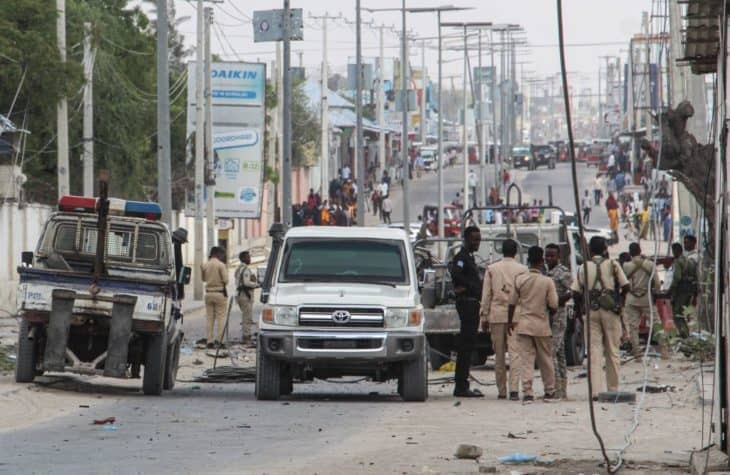You may not have caught it amidst other international developments, but the United States bombed Somalia last Friday. No, that isn’t a misprint.
On June 3, the Somali government announced that the US had conducted an airstrike against al-Shabaab militants west of the southern port city of Kismayo, killing approximately five fighters. The Pentagon has yet to release any information about the strike, a concerning (but not surprising) display of nonchalance.
The latest strike came as President Biden reversed his predecessor’s decision to withdraw all US troops from Somalia. Approximately 500 Americans will now return to train Somali counterterrorism forces and aid Mogadishu in its counterinsurgency campaign against al-Shabaab, a terrorist organisation that controls swaths of the East African country and has penetrated deep into the Somali capital. Somalia’s newly elected president, Hassan Sheikh Mohamud, is understandably thrilled about American special operators and trainers re-locating from next-door Kenya.
Both moves suggest the White House intends to escalate the forever war on terror
Both moves suggest the White House intends to escalate the forever war on terror. American forces stationed in Somalia will be tasked with helping Mogadishu reclaim some of the territory it lost after months of political infighting. UN counterterrorism experts assess that al-Shabaab has nearly 12,000 fighters and is al-Qaeda’s richest affiliate, netting $10 million a month from illegal taxes, extortion, and illicit charcoal sales.
Yet al-Shabaab is also an organisation often at war with itself, internally divided about goals, methods, and messaging — and like Somalia itself, the group is challenged by rivalries along lines of clan and personality. Some experts have seen evidence that al-Shabaab, while brutal in its attacks and technically associated with al-Qaeda, is predominately focused on domestic aims like overthrowing the Somali government rather than striking overseas. Foreign fighters more prone to external attacks have been marginalised from the group’s leadership after years of internal crackdowns.
Regardless of the exact composition and motivations of al-Shabaab, the Biden administration is likely to rely on the same tools as its predecessors to keep pressure on the organisation. One of those tools, of course, is drone strikes. Biden will be the fourth president to utilise targeted killing as a core component of his counterterrorism policy. Last week’s strike in Somalia certainly wasn’t the first time a US drone strike occurred on Biden’s watch.
What is interesting, however, is that the number of strikes has gone down precipitously during Biden’s presidency. President Obama conducted 55 drone strikes during his first year in office, most of them in Pakistan. One hundred and ninety-one such strikes were authorised during President Trump’s first year, and that doesn’t even include Syria and Iraq, where an active US air campaign was pulverising the Islamic State. In contrast, Biden’s first year was quite restrained, with about a dozen drone strikes hitting low-level Shabaab fighters in Somalia and what the defence department said were high-level al-Qaeda facilitators in Syria. In Somalia alone, the number of strikes dropped by about 93 per cent between the last year of the Trump administration and the first year of Biden’s term.
No one element is responsible for the overall decline. The lack of hard terrorist targets likely contributed to the numbers — to take one example, al-Qaeda’s affiliate in Yemen is no longer as strong as it was once. The US hasn’t executed a targeted killing operation in Pakistan since July 2018 — and with American forces no longer on the ground in Afghanistan, Washington has even less reason to look at Pakistan’s tribal areas as a target.
But internal rule changes within the national security community are likely a part of the story as well. Shortly after entering office, the Biden White House initiated a review of Trump-era guidelines, which granted commanders a significant degree of leeway in deciding who was targeted and when an operation could be conducted. Outside of active battlefields in Afghanistan and Syria, Biden’s new rules required the Pentagon and CIA to obtain White House approval for specific strikes, a process designed to minimise civilian casualties.
Even those more specific guidelines, however, don’t produce perfect strikes. No matter how technologically impressive the platform may be, mistakes happen due to poor situational awareness, bad intelligence, and human error. A December 2021 drone strike in Syria injured an entire family that had nothing to do with terrorism. In August 2021, a strike against what the Pentagon thought was an Isis militant planning an imminent attack on the Kabul airport turned out to be an Afghan working for an American charity.
Drone strikes will remain a critical tool in the American counterterrorism arsenal. Used in some circumstances, like when terrorist groups actually represent an imminent and direct threat to the United States, they can be tactically effective. From the American perspective, they are far better than sending tens of thousands of troops to perform an expensive and futile mission to change hearts and minds.
But Washington should also recognise that whack-a-mole isn’t cost-free.
This article first appeared in the Spectator’s World Edition.






Comments